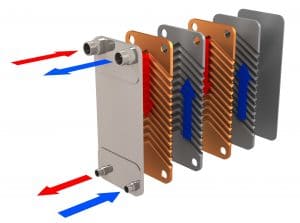 There are many reasons why heat exchangers have become preferable over most other thermal management solutions, and most of those reason stem from the fact that they don’t rely on chilling electrical enclosures to prevent overheating. For example, because heat exchangers transfer heat instead of chilling it, they don’t require as much equipment. This means they can fit into smaller spaces without losing their effectiveness, and they can operate continuously (often 24/7) with minimal energy requirements. Compared to chilling control panels and other electrical enclosures with air conditioning or air compressors, their ability to rapidly transfer heat makes them preferable in a wide variety of applications. (more…)
There are many reasons why heat exchangers have become preferable over most other thermal management solutions, and most of those reason stem from the fact that they don’t rely on chilling electrical enclosures to prevent overheating. For example, because heat exchangers transfer heat instead of chilling it, they don’t require as much equipment. This means they can fit into smaller spaces without losing their effectiveness, and they can operate continuously (often 24/7) with minimal energy requirements. Compared to chilling control panels and other electrical enclosures with air conditioning or air compressors, their ability to rapidly transfer heat makes them preferable in a wide variety of applications. (more…)
Reducing Maintenance Costs with Better Thermal Management
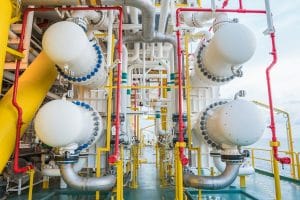 When it comes to consistently cooling electrical equipment, routine maintenance and repairs are vital. Thermal management prevents technology from overheating, and therefore, they prevent entire systems from crashing and having to be shut down for more extensive repairs or replacement. Therefore, preventing thermal management failures and hiccups is paramount for a company to keep its operations running smoothly. With modern heat exchangers, companies can enjoy greater peace of mind knowing their electrical thermal management needs are being met consistently and much less energy or need for maintenance than more traditional solutions. (more…)
When it comes to consistently cooling electrical equipment, routine maintenance and repairs are vital. Thermal management prevents technology from overheating, and therefore, they prevent entire systems from crashing and having to be shut down for more extensive repairs or replacement. Therefore, preventing thermal management failures and hiccups is paramount for a company to keep its operations running smoothly. With modern heat exchangers, companies can enjoy greater peace of mind knowing their electrical thermal management needs are being met consistently and much less energy or need for maintenance than more traditional solutions. (more…)
The Long-Term Impacts of Heat Exchangers
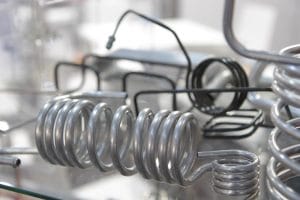 If asked what the greatest benefit of heat exchangers was, a company’s answer would depend on what its specific thermal management requirements are. For instance, most companies benefit from being able to keep their electrical enclosures cool without needing air conditioners. That automatically comes with a variety of benefits, but other companies might also enjoy the advantages of cleaner, more efficient, and more precise thermal management in several other processes. Whatever the specific benefits, the greatest advantage of heat exchangers is that they can operate more efficiently and more reliably than other solutions, and in many cases, they can do so for much longer. (more…)
If asked what the greatest benefit of heat exchangers was, a company’s answer would depend on what its specific thermal management requirements are. For instance, most companies benefit from being able to keep their electrical enclosures cool without needing air conditioners. That automatically comes with a variety of benefits, but other companies might also enjoy the advantages of cleaner, more efficient, and more precise thermal management in several other processes. Whatever the specific benefits, the greatest advantage of heat exchangers is that they can operate more efficiently and more reliably than other solutions, and in many cases, they can do so for much longer. (more…)
Questions About Innovative Thermal Pins
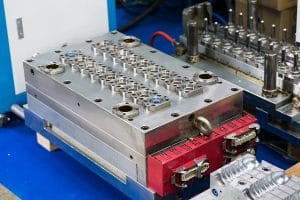 The more industries implement heat exchanger technology to solve their various thermal management needs, the more heat exchanger manufacturers continue to innovative cooling technology to fit increasingly more types of applications. That’s especially true for industries that rely on effective thermal management for more than just cooling electrical control panels and enclosures. For example, the process of creating molds depends on the rapid removal of heat. Once the superheated material has been poured into the mold, the speed at which it can be cooled largely determines a company’s overall productivity. With thermal pins, which are specialized heat exchangers designed specifically for the molding industry, companies can optimize that cooling time, and therefore, their overall productivity and output. (more…)
The more industries implement heat exchanger technology to solve their various thermal management needs, the more heat exchanger manufacturers continue to innovative cooling technology to fit increasingly more types of applications. That’s especially true for industries that rely on effective thermal management for more than just cooling electrical control panels and enclosures. For example, the process of creating molds depends on the rapid removal of heat. Once the superheated material has been poured into the mold, the speed at which it can be cooled largely determines a company’s overall productivity. With thermal pins, which are specialized heat exchangers designed specifically for the molding industry, companies can optimize that cooling time, and therefore, their overall productivity and output. (more…)
How Heat Exchangers Address These Cooling Challenges
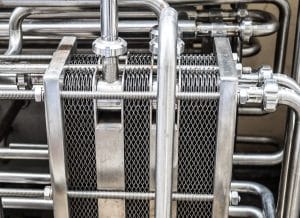 Companies across virtually every industry have implemented heat exchanger technology to address a wide range of thermal management needs. The more popular they become, the more companies realize that heat exchangers provide many more benefits than they initially expected. For example, in eliminating the need for traditional solutions such as air conditioners or air compressors, heat exchangers have given companies the freedom to streamline their electrical cooling applications in several beneficial ways. (more…)
Companies across virtually every industry have implemented heat exchanger technology to address a wide range of thermal management needs. The more popular they become, the more companies realize that heat exchangers provide many more benefits than they initially expected. For example, in eliminating the need for traditional solutions such as air conditioners or air compressors, heat exchangers have given companies the freedom to streamline their electrical cooling applications in several beneficial ways. (more…)
Making Below-Ambient Cooling Easier with Heat Exchangers
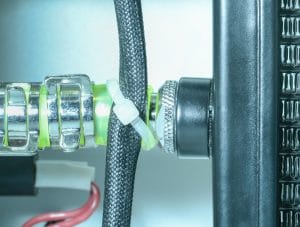 Heat exchangers became popular as a more affordable and eco-friendly solution than air conditioners for electrical thermal management. They achieve these benefits by eliminating the need to chill air with complex air-conditioning equipment, using simpler methods to transfer heat and prevent electrical overheating. However, there are many applications where chilled air is necessary to properly keep an electrical enclosure cooled. Whether that’s due to higher-than-usual energy output, particularly hot climates, or more, such applications have to be cooled to temperatures below the ambient temperature outside of the enclosures. Fortunately, high-performance, below-ambient heat exchangers can often provide the alternative, more cost-efficient solution they need. (more…)
Heat exchangers became popular as a more affordable and eco-friendly solution than air conditioners for electrical thermal management. They achieve these benefits by eliminating the need to chill air with complex air-conditioning equipment, using simpler methods to transfer heat and prevent electrical overheating. However, there are many applications where chilled air is necessary to properly keep an electrical enclosure cooled. Whether that’s due to higher-than-usual energy output, particularly hot climates, or more, such applications have to be cooled to temperatures below the ambient temperature outside of the enclosures. Fortunately, high-performance, below-ambient heat exchangers can often provide the alternative, more cost-efficient solution they need. (more…)
Ensuring Quality through Comprehensive Design
 Over the decade that they’ve been in service, heat exchangers have gained a reputation for providing reliable, high-performance thermal management for a wide variety of applications. Their success has helped countless companies dramatically reduce overhead by lowering energy costs, free up employee time by reducing the need for maintenance, and much more. However, like any product, heat exchangers and their successful operation rely on how well they’re manufactured. To ensure a consistently high level of quality, heat exchanger manufacturers focus on every detail and test every component before creating a final product. (more…)
Over the decade that they’ve been in service, heat exchangers have gained a reputation for providing reliable, high-performance thermal management for a wide variety of applications. Their success has helped countless companies dramatically reduce overhead by lowering energy costs, free up employee time by reducing the need for maintenance, and much more. However, like any product, heat exchangers and their successful operation rely on how well they’re manufactured. To ensure a consistently high level of quality, heat exchanger manufacturers focus on every detail and test every component before creating a final product. (more…)
How Heat Exchangers Fit into Oil & Gas Manufacturing
 Before implementing new technology into any industry, it first has to pass several tests to ensure that it can successfully meet the unique demands of that industry. For the oil and gas industry, those demands are especially challenging given the hazardous conditions that are often a routine part of operations. Fortunately, when it comes to streamlining thermal management for advanced technology, certain heat exchangers are specifically designed to benefit oil and gas companies, as well as others that operate under hazardous conditions. This means more companies can enjoy the benefits of heat exchangers even in environments that could prove too much for more sensitive technologies to handle. (more…)
Before implementing new technology into any industry, it first has to pass several tests to ensure that it can successfully meet the unique demands of that industry. For the oil and gas industry, those demands are especially challenging given the hazardous conditions that are often a routine part of operations. Fortunately, when it comes to streamlining thermal management for advanced technology, certain heat exchangers are specifically designed to benefit oil and gas companies, as well as others that operate under hazardous conditions. This means more companies can enjoy the benefits of heat exchangers even in environments that could prove too much for more sensitive technologies to handle. (more…)
Benefiting from Greener Thermal Management
 Thermal management was one of the first areas in which technological innovation meant greener, more efficient operations for most industries. That’s because most industries rely on advanced technology, and creating more efficient and eco-friendly electrical cooling with heat exchangers instead of air conditioners benefited all of them. Today, those benefits continue to multiply as companies continue adopt greener technologies, especially as more of those technologies utilize heat exchangers for their electrical thermal management needs. (more…)
Thermal management was one of the first areas in which technological innovation meant greener, more efficient operations for most industries. That’s because most industries rely on advanced technology, and creating more efficient and eco-friendly electrical cooling with heat exchangers instead of air conditioners benefited all of them. Today, those benefits continue to multiply as companies continue adopt greener technologies, especially as more of those technologies utilize heat exchangers for their electrical thermal management needs. (more…)
Automation Made Easier with the Help of Heat Exchangers
 Streamlining electrical thermal management has placed heat exchangers at the crux of advancing technology for several decades. For companies that relied on that technology, the ability to break free from their reliance on air conditioning-based electrical thermal management meant fewer maintenance headaches and lower energy expenditures. For designers continuously innovating more advanced technology for those companies to use, heat exchangers granted the freedom to design more compact devices and machinery that packed more power into smaller spaces. One of the most impactful benefits of that freedom has been automated technology, whose development and adoption have helped companies streamline their operations even further. (more…)
Streamlining electrical thermal management has placed heat exchangers at the crux of advancing technology for several decades. For companies that relied on that technology, the ability to break free from their reliance on air conditioning-based electrical thermal management meant fewer maintenance headaches and lower energy expenditures. For designers continuously innovating more advanced technology for those companies to use, heat exchangers granted the freedom to design more compact devices and machinery that packed more power into smaller spaces. One of the most impactful benefits of that freedom has been automated technology, whose development and adoption have helped companies streamline their operations even further. (more…)







